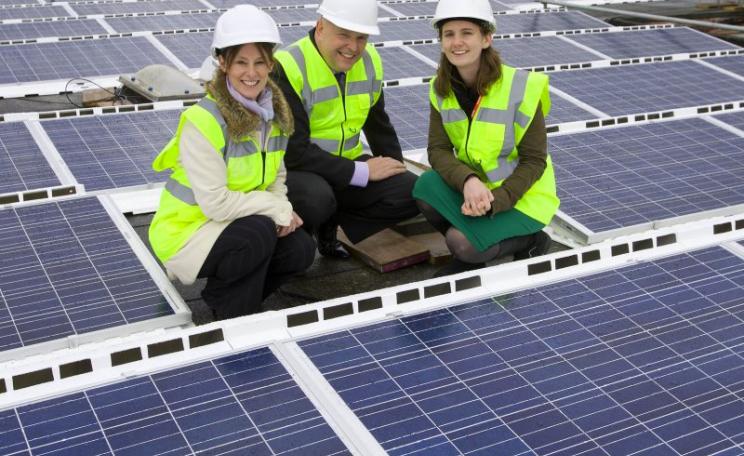The UK will fall a long short of its EU target of supplying 15% of its energy through renewables by 2020. This includes all energy, just just electricity, and we would need well over 30% of electricity to come from renewables to meet this target.
Largely because of the very success of the renewables deployment programme and the insistence by the Treasury of a cap on levies on electricity bills needed to pay for renewable energy, the UK's renewable energy programme is likely to be brought to an effective end by 2018, if not sooner.
Calculations suggest that the budget within the Treasury's 'Levy Control Framework' (LCF) set by the Treasury will soon be spent as onshore wind and solar PV farms are installed faster than expected.
Indeed energy finance analyst Nigel Cornwall reckons it could have been spent already.
Of course this spending crisis is one that is manufactured by the Treasury itself. The Treasury decided not to increase the 'carbon levy' on fossil fuel prices last year, thus meaning that its own budget for renewable energy incentives would not support so much renewable energy.
In addition to this wholesale power prices have fallen, again meaning that a given amount of incentives will develop less renewable energy.
UK set to miss EU renewable energy target - 15% by 2020
It seems that not only will funding for large onshore wind and solar farms be ended, but it is likely also we will hear announcements soon about the tailing off of support for small renewables in the feed-in tariff including domestic solar PV.
Just one or two token offshore windfarms may be left in the offing if they can achieve much reduced prices - despite energy secretary Amber Rudd's talking up of the sector.
You would think that the Treasury, knowing that energy prices will be much lower anyway, would increase the amount budgeted in the LCF. But no. Rather the Treasury appear to be using the situation to cut back on renewable energy. The Department of Energy and Climate Change (DECC) is reduced to being little more than a public relations cover for all this in the process.
The UK will therefore fall a long short of its EU target of supplying 15% of its energy through renewables by 2020. This includes all energy, note, just just electricity, and we would need well over 30% of electricity to come from renewables to meet this target.
The EU target could only be met if the UK greatly accelerated its deployment of renewables in the next five years, especially in the last 2-3 years.
Yet all the signs are that the Treasury will ensure that this is precisely the time when the programme will be more or less shut down.
DECC to suffer massive cuts - hitting UK's 'energy transition'
A new report from the Green Alliance, meanwhile, shows that DECC is to suffer huge cuts in its budget which will fall entirely on the 'non ring-fenced' parts of its budget needed to deliver the UK's transition to a low-carbon energy system. Most of DECC's budget is pre-committed to decommissioning old nuclear siotes.
The UK will fall a long short of its EU target of supplying 15% of its energy through renewables by 2020. This includes all energy, just just electricity, and we would need well over 30% of electricity to come from renewables to meet this target.
Over the next five years, GA estimates, "DECC will need to spend £19.8 billion to meet its commitments. Of this, £16.3 billion is officially or unofficially ring-fenced for legacy costs. Just £3.5 billion is not ring-fenced and available to deliver the UK’s energy transition: ie around £700 million per year on average.
"However, the roller coaster spending profile of the next parliament means that DECC could have just £350 million for all non ring-fenced activity in 2017-18, compromising major DECC programmes. And, because of commitments to preserve capital spending, by 2018-19 only £40 million would be available for all staffing, analysis and policy implementation functions ...
"A dumbed down DECC, unable to spend its own budget wisely on analysis, energy efficiency and strategy, might overspend on levy-funded low carbon generation, driving up the cost of decarbonisation."
Budgets will be tight, says GA, "but decision makers have options. For example, cutting CCS capital grants means UK CCS simply will not happen. In contrast, energy efficiency outcomes can be delivered with less direct spending, through smart regulation and by enabling efficiency to compete with new supply."
And its conclusion is clear: "DECC needs a better than average budget settlement because most of its spending is ring-fenced and capital intensive. Without it, the department will struggle to achieve its mission and the UK is much less likely to have secure, clean and affordable energy."
Dr David Toke is Reader in Energy Politics in the Department of Politics and International Relations in the University of Aberdeen.
David's latest book, Ecological Modernisation and Renewable Energy, was published in March 2011 by Palgrave.
This article is based on one originally published on David Toke's blog page, with additional reporting by The Ecologist.
More information on Solar Portal.







